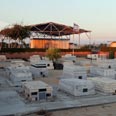
GAZA - The family of Elkana Govi came to his grave on Tuesday, Memorial Day Eve, to pay their respects to his memory -- perhaps for the last time before the planned Israeli disengagement from Gaza in August.
Elkana was killed during a terrorist attack in March 2002, but reviewing his son's journal, Moshe believes that he would have wholeheartedly opposed disengagement had he lived.
"An obviously illegal command should not be executed," Corporal Govi wrote before he was cut down in his youth.
Moshe believes that unilateral withdrawal would also dishonor his son's death.
"Personally, we do not need a Memorial Day, we have one every day," he said. "But this Memorial Day is different because it has deeper meanings. On this Memorial Day, everyone should remember, especially the prime minister, what our sons did and why they died."
One of many Gaza families
His feelings regarding those who have lived and died in Gaza was echoed in a letter sent to Prime Minister Ariel Sharon on Tuesday. Bereaved Gush Katif families told Sharon that “no man has a right to open our loved ones’ graves without our permission.”
The letter also said that doing so would be illegal and immoral, and it wondered how “Shimon Peres could consider the building of vacation homes for murderers on the graves of their victims.”
The families said that Peres would do better by ensuring that the graves stay where they are, and everyone be guaranteed the right to visit them.
They also expressed strong opposition to opening graves without the permission of settler families.
“The graves are not state property, and it cannot do whatever it fancies,” the letter said. “The disinterring graves will just re-open old wounds for families and cause unnecessary suffering.”
The letter went on to accuse the government of treating the issue of the graves in the same “humiliating” manner it treated Gaza settlers in general. It demanded that government officials appear before the settlers to explain their actions.
“No one came to the families - no psychologists, social workers or rabbis - to prepare them for the necessary shock involving the re-opening of old wounds,” the letter said.
Illegal, immoral treatment
The settler families noted the High Court of Justice has ruled that the Basic Law on Human Dignity also applies to the deceased and their families. They also argued that the government’s plan violated the 1950 Military Cemeteries Law, which set strict guidelines for disinterring the dead.
The families pointed out that many of those buried in Gush Katif were killed by terrorists – perhaps the very same people who stood to build homes on the former Jewish cemetery.
“You should wait at least until the families have decided where they plan to live if, God forbid, disengagement is carried out,” the letter asked of Sharon, Defense Minister Shaul Mofaz and Disenaggement Authority Chief Yonatan Bassi.
“It’s hard to imagine suffering families would decide what to do with their dead when the government has not yet made it clear what will happen with the living.”















